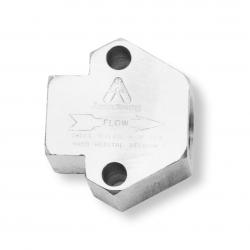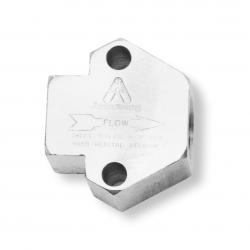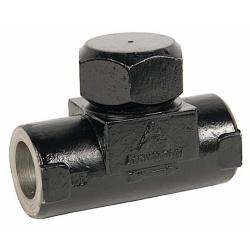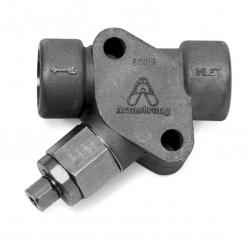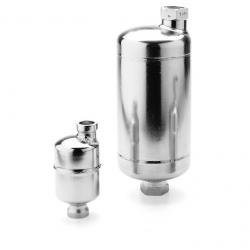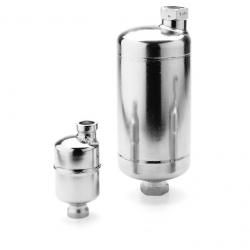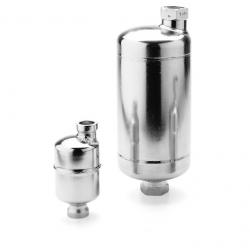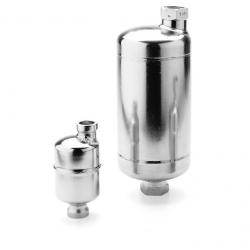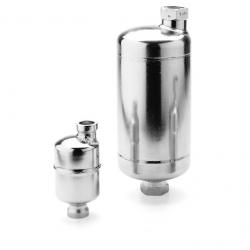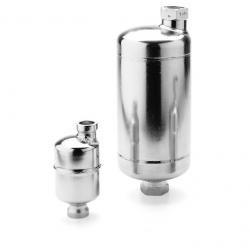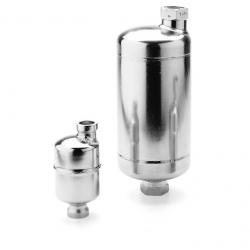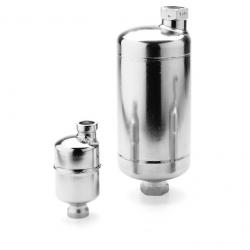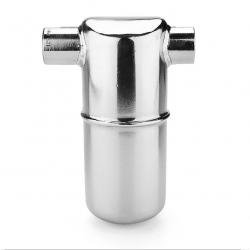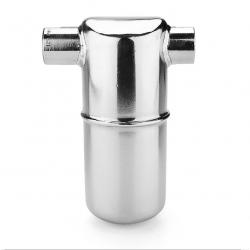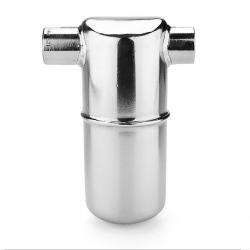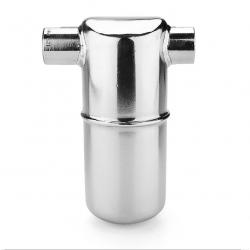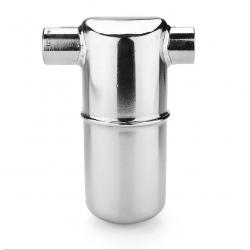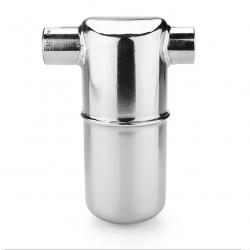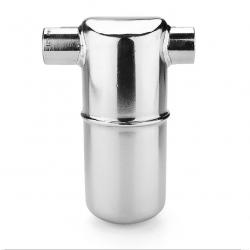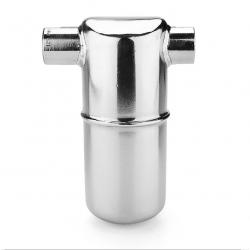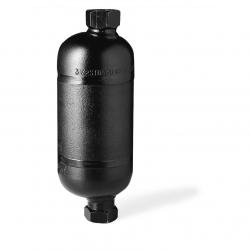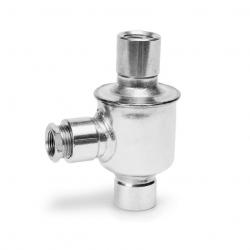Armstrong
Fluke
View:
Active Filters :
- Brand: Fluke Armstrong
- Material: Stainless Steel
- Alt. Size: 3/4"
Part #:501-A21862
- CD-33 Series Disc Steam TrapFor steam service up to 600 psig (42 barg)
Capacities to 2,500 lb/hr (1,134 kg/hr).
The Armstrong CD-33 is a disc-style trap designed to control the traps cycle rate. By reducing the cycle rate, the Armstrong CD-33 extends its service life well beyond that of typical disc traps. This enhanced performance minimizes maintenance time and greatly reduces steam costs.
The CD-33 is designed with three discharge ports, which offer stable disc operation to extend operating life. The capacities of the Armstrong CD-33 have been engineered specifically for the following applications large steam main drips, process equipment and HVAC heating equipment on constant pressure.
The CD-33L (low capacity) trap is designed for the low capacity applications of steam main drips and steam tracing lines. By ensuring that the capacities are designed to suit the applicationand are not oversizedthe CD-33 Series will last longer than other disc traps with excessive capacity ratings. Heres why
• Three-discharge port design
• Minimum wear with controlled cycling
• Freeze resistant
• Hardened seat and disc
Qty:
Part #:501-B2311C-2
- Steam Trap ConnectorsBesides 2000 Series stainless steel inverted bucket traps, the standard 360 connector or IS-2 connector with integral strainer can also be used on many Armstrong thermostatic, disc, bimetallic, and float and thermostatic traps. Any manufacturers two-bolt steam traps can use Armstrong connectors.
IS-2 Stainless Steel Connector with Integral Strainer
• A full line stainless steel strainer in the connector eliminates leak points and reduces installation time
• A strainer that is not discarded when the trap is replaced
• Easy strainer screen replacement
• Optional blowdown valve
• Accommodates Armstrongs inverted bucket, disc, thermostatic, thermostatic wafer, bimetallic, and float and thermostatic traps. Any manufacturers 2-bolt steam trap can also be applied to Armstrongs S-2 connector.
Standard 360 Stainless Steel Connector
• A compact, lightweight assembly
• Standardization, reducing inventory
• A compact design, simplifying piping
• Accommodates Armstrongs inverted bucket, disc, thermostatic, thermostatic wafer and bimetallic steam traps. Any manufacturers 2-bolt steam trap can also be applied to Armstrongs standard connector.
Qty:
Part #:501-B2311D-2
- Steam Trap ConnectorsBesides 2000 Series stainless steel inverted bucket traps, the standard 360 connector or IS-2 connector with integral strainer can also be used on many Armstrong thermostatic, disc, bimetallic, and float and thermostatic traps. Any manufacturers two-bolt steam traps can use Armstrong connectors.
IS-2 Stainless Steel Connector with Integral Strainer
• A full line stainless steel strainer in the connector eliminates leak points and reduces installation time
• A strainer that is not discarded when the trap is replaced
• Easy strainer screen replacement
• Optional blowdown valve
• Accommodates Armstrongs inverted bucket, disc, thermostatic, thermostatic wafer, bimetallic, and float and thermostatic traps. Any manufacturers 2-bolt steam trap can also be applied to Armstrongs S-2 connector.
Standard 360 Stainless Steel Connector
• A compact, lightweight assembly
• Standardization, reducing inventory
• A compact design, simplifying piping
• Accommodates Armstrongs inverted bucket, disc, thermostatic, thermostatic wafer and bimetallic steam traps. Any manufacturers 2-bolt steam trap can also be applied to Armstrongs standard connector.
Qty:
Part #:501-B5663
- CD-33 Series Disc Steam TrapFor steam service up to 600 psig (42 barg)
Capacities to 2,500 lb/hr (1,134 kg/hr).
The Armstrong CD-33 is a disc-style trap designed to control the traps cycle rate. By reducing the cycle rate, the Armstrong CD-33 extends its service life well beyond that of typical disc traps. This enhanced performance minimizes maintenance time and greatly reduces steam costs.
The CD-33 is designed with three discharge ports, which offer stable disc operation to extend operating life. The capacities of the Armstrong CD-33 have been engineered specifically for the following applications large steam main drips, process equipment and HVAC heating equipment on constant pressure.
The CD-33L (low capacity) trap is designed for the low capacity applications of steam main drips and steam tracing lines. By ensuring that the capacities are designed to suit the applicationand are not oversizedthe CD-33 Series will last longer than other disc traps with excessive capacity ratings. Heres why
• Three-discharge port design
• Minimum wear with controlled cycling
• Freeze resistant
• Hardened seat and disc
Qty:
Part #:501-B5667
- CD-33 Series Disc Steam TrapFor steam service up to 600 psig (42 barg)
Capacities to 2,500 lb/hr (1,134 kg/hr).
The Armstrong CD-33 is a disc-style trap designed to control the traps cycle rate. By reducing the cycle rate, the Armstrong CD-33 extends its service life well beyond that of typical disc traps. This enhanced performance minimizes maintenance time and greatly reduces steam costs.
The CD-33 is designed with three discharge ports, which offer stable disc operation to extend operating life. The capacities of the Armstrong CD-33 have been engineered specifically for the following applications large steam main drips, process equipment and HVAC heating equipment on constant pressure.
The CD-33L (low capacity) trap is designed for the low capacity applications of steam main drips and steam tracing lines. By ensuring that the capacities are designed to suit the applicationand are not oversizedthe CD-33 Series will last longer than other disc traps with excessive capacity ratings. Heres why
• Three-discharge port design
• Minimum wear with controlled cycling
• Freeze resistant
• Hardened seat and disc
Qty:
Part #:501-C4920
- Steam Trap ConnectorsBesides 2000 Series stainless steel inverted bucket traps, the standard 360 connector or IS-2 connector with integral strainer can also be used on many Armstrong thermostatic, disc, bimetallic, and float and thermostatic traps. Any manufacturers two-bolt steam traps can use Armstrong connectors.
IS-2 Stainless Steel Connector with Integral Strainer
• A full line stainless steel strainer in the connector eliminates leak points and reduces installation time
• A strainer that is not discarded when the trap is replaced
• Easy strainer screen replacement
• Optional blowdown valve
• Accommodates Armstrongs inverted bucket, disc, thermostatic, thermostatic wafer, bimetallic, and float and thermostatic traps. Any manufacturers 2-bolt steam trap can also be applied to Armstrongs S-2 connector.
Standard 360 Stainless Steel Connector
• A compact, lightweight assembly
• Standardization, reducing inventory
• A compact design, simplifying piping
• Accommodates Armstrongs inverted bucket, disc, thermostatic, thermostatic wafer and bimetallic steam traps. Any manufacturers 2-bolt steam trap can also be applied to Armstrongs standard connector.
Qty:
Part #:501-C5315-1
- Inverted Bucket Steam TrapsEnergy efficient because it's so reliable
The inverted bucket is the most reliable steam trap operating principle known. The heart of its simple design is a unique leverage system that multiplies the force provided by the bucket to open the valve against pressure.
Since the bucket is open at the bottom, it resists damage from water hammer, and wear points are heavily reinforced for long life. The inverted bucket has only two moving parts-the valve lever assembly and the bucket. That means no fixed points, no complicated linkage. Nothing to stick, bind or clog.
Conserves energy even in the presence of wear
Armstrong inverted bucket steam traps open and close based on the difference in density between condensate and steam-the inverted bucket principle. They open and close gently, minimizing wear. This simple fact means that inverted buckets are subject to less wear than some other types of traps.
In fact, as an Armstrong inverted bucket trap wears, its tight seal actually improves. The valve and seat of the Armstrong trap provide essentially line contact-resulting in a tight seal because the entire closing force is concentrated on one narrow seating ring.
An Armstrong inverted bucket steam trap continues to operate efficiently with use. Gradual wear slightly increases the diameter of the seat and alters the shape and diameter of the valve. But, as this occurs, a tight seal is still preserved-the ball merely seats itself more deeply.
Corrosion-resistant parts
The stainless steel valve and seat of the Armstrong inverted bucket steam trap are individually ground and lapped together in matched sets. All other working parts are wear- and corrosion-resistant stainless steel.
Venting of air and CO2
The Armstrong inverted bucket provides continuous automatic air and CO2 venting with no cooling lag or threat of air binding.
Operation against back pressure
The Armstrong inverted bucket has excellent performance against back pressure. It has no adverse effect on inverted bucket operation other than to reduce its capacity by the low differential. The bucket simply requires less force to pull the valve open and cycle the trap.
Freedom from dirt problems
Armstrong designed its inverted bucket to be virtually free of dirt problems. The valve and seat are at the top of the trap, far away from the larger particles of dirt, which fall to the bottom. Here, the up-and-down action of the bucket pulverizes them.
Since the valve of an inverted bucket is either fully closed or open, dirt particles pass freely. And the swift flow of condensate from under the bucket's edge creates a unique self-scrubbing action that sweeps dirt out of the trap.
Qty:
Part #:501-C5315-2
- Inverted Bucket Steam TrapsEnergy efficient because it's so reliable
The inverted bucket is the most reliable steam trap operating principle known. The heart of its simple design is a unique leverage system that multiplies the force provided by the bucket to open the valve against pressure.
Since the bucket is open at the bottom, it resists damage from water hammer, and wear points are heavily reinforced for long life. The inverted bucket has only two moving parts-the valve lever assembly and the bucket. That means no fixed points, no complicated linkage. Nothing to stick, bind or clog.
Conserves energy even in the presence of wear
Armstrong inverted bucket steam traps open and close based on the difference in density between condensate and steam-the inverted bucket principle. They open and close gently, minimizing wear. This simple fact means that inverted buckets are subject to less wear than some other types of traps.
In fact, as an Armstrong inverted bucket trap wears, its tight seal actually improves. The valve and seat of the Armstrong trap provide essentially line contact-resulting in a tight seal because the entire closing force is concentrated on one narrow seating ring.
An Armstrong inverted bucket steam trap continues to operate efficiently with use. Gradual wear slightly increases the diameter of the seat and alters the shape and diameter of the valve. But, as this occurs, a tight seal is still preserved-the ball merely seats itself more deeply.
Corrosion-resistant parts
The stainless steel valve and seat of the Armstrong inverted bucket steam trap are individually ground and lapped together in matched sets. All other working parts are wear- and corrosion-resistant stainless steel.
Venting of air and CO2
The Armstrong inverted bucket provides continuous automatic air and CO2 venting with no cooling lag or threat of air binding.
Operation against back pressure
The Armstrong inverted bucket has excellent performance against back pressure. It has no adverse effect on inverted bucket operation other than to reduce its capacity by the low differential. The bucket simply requires less force to pull the valve open and cycle the trap.
Freedom from dirt problems
Armstrong designed its inverted bucket to be virtually free of dirt problems. The valve and seat are at the top of the trap, far away from the larger particles of dirt, which fall to the bottom. Here, the up-and-down action of the bucket pulverizes them.
Since the valve of an inverted bucket is either fully closed or open, dirt particles pass freely. And the swift flow of condensate from under the bucket's edge creates a unique self-scrubbing action that sweeps dirt out of the trap.
Qty:
Part #:501-C5315-3
- Inverted Bucket Steam TrapsEnergy efficient because it's so reliable
The inverted bucket is the most reliable steam trap operating principle known. The heart of its simple design is a unique leverage system that multiplies the force provided by the bucket to open the valve against pressure.
Since the bucket is open at the bottom, it resists damage from water hammer, and wear points are heavily reinforced for long life. The inverted bucket has only two moving parts-the valve lever assembly and the bucket. That means no fixed points, no complicated linkage. Nothing to stick, bind or clog.
Conserves energy even in the presence of wear
Armstrong inverted bucket steam traps open and close based on the difference in density between condensate and steam-the inverted bucket principle. They open and close gently, minimizing wear. This simple fact means that inverted buckets are subject to less wear than some other types of traps.
In fact, as an Armstrong inverted bucket trap wears, its tight seal actually improves. The valve and seat of the Armstrong trap provide essentially line contact-resulting in a tight seal because the entire closing force is concentrated on one narrow seating ring.
An Armstrong inverted bucket steam trap continues to operate efficiently with use. Gradual wear slightly increases the diameter of the seat and alters the shape and diameter of the valve. But, as this occurs, a tight seal is still preserved-the ball merely seats itself more deeply.
Corrosion-resistant parts
The stainless steel valve and seat of the Armstrong inverted bucket steam trap are individually ground and lapped together in matched sets. All other working parts are wear- and corrosion-resistant stainless steel.
Venting of air and CO2
The Armstrong inverted bucket provides continuous automatic air and CO2 venting with no cooling lag or threat of air binding.
Operation against back pressure
The Armstrong inverted bucket has excellent performance against back pressure. It has no adverse effect on inverted bucket operation other than to reduce its capacity by the low differential. The bucket simply requires less force to pull the valve open and cycle the trap.
Freedom from dirt problems
Armstrong designed its inverted bucket to be virtually free of dirt problems. The valve and seat are at the top of the trap, far away from the larger particles of dirt, which fall to the bottom. Here, the up-and-down action of the bucket pulverizes them.
Since the valve of an inverted bucket is either fully closed or open, dirt particles pass freely. And the swift flow of condensate from under the bucket's edge creates a unique self-scrubbing action that sweeps dirt out of the trap.
Qty:
Part #:501-C5319-10
- Inverted Bucket Steam TrapsEnergy efficient because it's so reliable
The inverted bucket is the most reliable steam trap operating principle known. The heart of its simple design is a unique leverage system that multiplies the force provided by the bucket to open the valve against pressure.
Since the bucket is open at the bottom, it resists damage from water hammer, and wear points are heavily reinforced for long life. The inverted bucket has only two moving parts-the valve lever assembly and the bucket. That means no fixed points, no complicated linkage. Nothing to stick, bind or clog.
Conserves energy even in the presence of wear
Armstrong inverted bucket steam traps open and close based on the difference in density between condensate and steam-the inverted bucket principle. They open and close gently, minimizing wear. This simple fact means that inverted buckets are subject to less wear than some other types of traps.
In fact, as an Armstrong inverted bucket trap wears, its tight seal actually improves. The valve and seat of the Armstrong trap provide essentially line contact-resulting in a tight seal because the entire closing force is concentrated on one narrow seating ring.
An Armstrong inverted bucket steam trap continues to operate efficiently with use. Gradual wear slightly increases the diameter of the seat and alters the shape and diameter of the valve. But, as this occurs, a tight seal is still preserved-the ball merely seats itself more deeply.
Corrosion-resistant parts
The stainless steel valve and seat of the Armstrong inverted bucket steam trap are individually ground and lapped together in matched sets. All other working parts are wear- and corrosion-resistant stainless steel.
Venting of air and CO2
The Armstrong inverted bucket provides continuous automatic air and CO2 venting with no cooling lag or threat of air binding.
Operation against back pressure
The Armstrong inverted bucket has excellent performance against back pressure. It has no adverse effect on inverted bucket operation other than to reduce its capacity by the low differential. The bucket simply requires less force to pull the valve open and cycle the trap.
Freedom from dirt problems
Armstrong designed its inverted bucket to be virtually free of dirt problems. The valve and seat are at the top of the trap, far away from the larger particles of dirt, which fall to the bottom. Here, the up-and-down action of the bucket pulverizes them.
Since the valve of an inverted bucket is either fully closed or open, dirt particles pass freely. And the swift flow of condensate from under the bucket's edge creates a unique self-scrubbing action that sweeps dirt out of the trap.
Qty:
Part #:501-C5319-2
- Inverted Bucket Steam TrapsEnergy efficient because it's so reliable
The inverted bucket is the most reliable steam trap operating principle known. The heart of its simple design is a unique leverage system that multiplies the force provided by the bucket to open the valve against pressure.
Since the bucket is open at the bottom, it resists damage from water hammer, and wear points are heavily reinforced for long life. The inverted bucket has only two moving parts-the valve lever assembly and the bucket. That means no fixed points, no complicated linkage. Nothing to stick, bind or clog.
Conserves energy even in the presence of wear
Armstrong inverted bucket steam traps open and close based on the difference in density between condensate and steam-the inverted bucket principle. They open and close gently, minimizing wear. This simple fact means that inverted buckets are subject to less wear than some other types of traps.
In fact, as an Armstrong inverted bucket trap wears, its tight seal actually improves. The valve and seat of the Armstrong trap provide essentially line contact-resulting in a tight seal because the entire closing force is concentrated on one narrow seating ring.
An Armstrong inverted bucket steam trap continues to operate efficiently with use. Gradual wear slightly increases the diameter of the seat and alters the shape and diameter of the valve. But, as this occurs, a tight seal is still preserved-the ball merely seats itself more deeply.
Corrosion-resistant parts
The stainless steel valve and seat of the Armstrong inverted bucket steam trap are individually ground and lapped together in matched sets. All other working parts are wear- and corrosion-resistant stainless steel.
Venting of air and CO2
The Armstrong inverted bucket provides continuous automatic air and CO2 venting with no cooling lag or threat of air binding.
Operation against back pressure
The Armstrong inverted bucket has excellent performance against back pressure. It has no adverse effect on inverted bucket operation other than to reduce its capacity by the low differential. The bucket simply requires less force to pull the valve open and cycle the trap.
Freedom from dirt problems
Armstrong designed its inverted bucket to be virtually free of dirt problems. The valve and seat are at the top of the trap, far away from the larger particles of dirt, which fall to the bottom. Here, the up-and-down action of the bucket pulverizes them.
Since the valve of an inverted bucket is either fully closed or open, dirt particles pass freely. And the swift flow of condensate from under the bucket's edge creates a unique self-scrubbing action that sweeps dirt out of the trap.
Qty:
Part #:501-C5319-7
- Inverted Bucket Steam TrapsEnergy efficient because it's so reliable
The inverted bucket is the most reliable steam trap operating principle known. The heart of its simple design is a unique leverage system that multiplies the force provided by the bucket to open the valve against pressure.
Since the bucket is open at the bottom, it resists damage from water hammer, and wear points are heavily reinforced for long life. The inverted bucket has only two moving parts-the valve lever assembly and the bucket. That means no fixed points, no complicated linkage. Nothing to stick, bind or clog.
Conserves energy even in the presence of wear
Armstrong inverted bucket steam traps open and close based on the difference in density between condensate and steam-the inverted bucket principle. They open and close gently, minimizing wear. This simple fact means that inverted buckets are subject to less wear than some other types of traps.
In fact, as an Armstrong inverted bucket trap wears, its tight seal actually improves. The valve and seat of the Armstrong trap provide essentially line contact-resulting in a tight seal because the entire closing force is concentrated on one narrow seating ring.
An Armstrong inverted bucket steam trap continues to operate efficiently with use. Gradual wear slightly increases the diameter of the seat and alters the shape and diameter of the valve. But, as this occurs, a tight seal is still preserved-the ball merely seats itself more deeply.
Corrosion-resistant parts
The stainless steel valve and seat of the Armstrong inverted bucket steam trap are individually ground and lapped together in matched sets. All other working parts are wear- and corrosion-resistant stainless steel.
Venting of air and CO2
The Armstrong inverted bucket provides continuous automatic air and CO2 venting with no cooling lag or threat of air binding.
Operation against back pressure
The Armstrong inverted bucket has excellent performance against back pressure. It has no adverse effect on inverted bucket operation other than to reduce its capacity by the low differential. The bucket simply requires less force to pull the valve open and cycle the trap.
Freedom from dirt problems
Armstrong designed its inverted bucket to be virtually free of dirt problems. The valve and seat are at the top of the trap, far away from the larger particles of dirt, which fall to the bottom. Here, the up-and-down action of the bucket pulverizes them.
Since the valve of an inverted bucket is either fully closed or open, dirt particles pass freely. And the swift flow of condensate from under the bucket's edge creates a unique self-scrubbing action that sweeps dirt out of the trap.
Qty:
Part #:501-C5319-8
- Inverted Bucket Steam TrapsEnergy efficient because it's so reliable
The inverted bucket is the most reliable steam trap operating principle known. The heart of its simple design is a unique leverage system that multiplies the force provided by the bucket to open the valve against pressure.
Since the bucket is open at the bottom, it resists damage from water hammer, and wear points are heavily reinforced for long life. The inverted bucket has only two moving parts-the valve lever assembly and the bucket. That means no fixed points, no complicated linkage. Nothing to stick, bind or clog.
Conserves energy even in the presence of wear
Armstrong inverted bucket steam traps open and close based on the difference in density between condensate and steam-the inverted bucket principle. They open and close gently, minimizing wear. This simple fact means that inverted buckets are subject to less wear than some other types of traps.
In fact, as an Armstrong inverted bucket trap wears, its tight seal actually improves. The valve and seat of the Armstrong trap provide essentially line contact-resulting in a tight seal because the entire closing force is concentrated on one narrow seating ring.
An Armstrong inverted bucket steam trap continues to operate efficiently with use. Gradual wear slightly increases the diameter of the seat and alters the shape and diameter of the valve. But, as this occurs, a tight seal is still preserved-the ball merely seats itself more deeply.
Corrosion-resistant parts
The stainless steel valve and seat of the Armstrong inverted bucket steam trap are individually ground and lapped together in matched sets. All other working parts are wear- and corrosion-resistant stainless steel.
Venting of air and CO2
The Armstrong inverted bucket provides continuous automatic air and CO2 venting with no cooling lag or threat of air binding.
Operation against back pressure
The Armstrong inverted bucket has excellent performance against back pressure. It has no adverse effect on inverted bucket operation other than to reduce its capacity by the low differential. The bucket simply requires less force to pull the valve open and cycle the trap.
Freedom from dirt problems
Armstrong designed its inverted bucket to be virtually free of dirt problems. The valve and seat are at the top of the trap, far away from the larger particles of dirt, which fall to the bottom. Here, the up-and-down action of the bucket pulverizes them.
Since the valve of an inverted bucket is either fully closed or open, dirt particles pass freely. And the swift flow of condensate from under the bucket's edge creates a unique self-scrubbing action that sweeps dirt out of the trap.
Qty:
Part #:501-C5319-9
- Inverted Bucket Steam TrapsEnergy efficient because it's so reliable
The inverted bucket is the most reliable steam trap operating principle known. The heart of its simple design is a unique leverage system that multiplies the force provided by the bucket to open the valve against pressure.
Since the bucket is open at the bottom, it resists damage from water hammer, and wear points are heavily reinforced for long life. The inverted bucket has only two moving parts-the valve lever assembly and the bucket. That means no fixed points, no complicated linkage. Nothing to stick, bind or clog.
Conserves energy even in the presence of wear
Armstrong inverted bucket steam traps open and close based on the difference in density between condensate and steam-the inverted bucket principle. They open and close gently, minimizing wear. This simple fact means that inverted buckets are subject to less wear than some other types of traps.
In fact, as an Armstrong inverted bucket trap wears, its tight seal actually improves. The valve and seat of the Armstrong trap provide essentially line contact-resulting in a tight seal because the entire closing force is concentrated on one narrow seating ring.
An Armstrong inverted bucket steam trap continues to operate efficiently with use. Gradual wear slightly increases the diameter of the seat and alters the shape and diameter of the valve. But, as this occurs, a tight seal is still preserved-the ball merely seats itself more deeply.
Corrosion-resistant parts
The stainless steel valve and seat of the Armstrong inverted bucket steam trap are individually ground and lapped together in matched sets. All other working parts are wear- and corrosion-resistant stainless steel.
Venting of air and CO2
The Armstrong inverted bucket provides continuous automatic air and CO2 venting with no cooling lag or threat of air binding.
Operation against back pressure
The Armstrong inverted bucket has excellent performance against back pressure. It has no adverse effect on inverted bucket operation other than to reduce its capacity by the low differential. The bucket simply requires less force to pull the valve open and cycle the trap.
Freedom from dirt problems
Armstrong designed its inverted bucket to be virtually free of dirt problems. The valve and seat are at the top of the trap, far away from the larger particles of dirt, which fall to the bottom. Here, the up-and-down action of the bucket pulverizes them.
Since the valve of an inverted bucket is either fully closed or open, dirt particles pass freely. And the swift flow of condensate from under the bucket's edge creates a unique self-scrubbing action that sweeps dirt out of the trap.
Qty:
Part #:501-C5323-10
- Inverted Bucket Steam TrapsEnergy efficient because it's so reliable
The inverted bucket is the most reliable steam trap operating principle known. The heart of its simple design is a unique leverage system that multiplies the force provided by the bucket to open the valve against pressure.
Since the bucket is open at the bottom, it resists damage from water hammer, and wear points are heavily reinforced for long life. The inverted bucket has only two moving parts-the valve lever assembly and the bucket. That means no fixed points, no complicated linkage. Nothing to stick, bind or clog.
Conserves energy even in the presence of wear
Armstrong inverted bucket steam traps open and close based on the difference in density between condensate and steam-the inverted bucket principle. They open and close gently, minimizing wear. This simple fact means that inverted buckets are subject to less wear than some other types of traps.
In fact, as an Armstrong inverted bucket trap wears, its tight seal actually improves. The valve and seat of the Armstrong trap provide essentially line contact-resulting in a tight seal because the entire closing force is concentrated on one narrow seating ring.
An Armstrong inverted bucket steam trap continues to operate efficiently with use. Gradual wear slightly increases the diameter of the seat and alters the shape and diameter of the valve. But, as this occurs, a tight seal is still preserved-the ball merely seats itself more deeply.
Corrosion-resistant parts
The stainless steel valve and seat of the Armstrong inverted bucket steam trap are individually ground and lapped together in matched sets. All other working parts are wear- and corrosion-resistant stainless steel.
Venting of air and CO2
The Armstrong inverted bucket provides continuous automatic air and CO2 venting with no cooling lag or threat of air binding.
Operation against back pressure
The Armstrong inverted bucket has excellent performance against back pressure. It has no adverse effect on inverted bucket operation other than to reduce its capacity by the low differential. The bucket simply requires less force to pull the valve open and cycle the trap.
Freedom from dirt problems
Armstrong designed its inverted bucket to be virtually free of dirt problems. The valve and seat are at the top of the trap, far away from the larger particles of dirt, which fall to the bottom. Here, the up-and-down action of the bucket pulverizes them.
Since the valve of an inverted bucket is either fully closed or open, dirt particles pass freely. And the swift flow of condensate from under the bucket's edge creates a unique self-scrubbing action that sweeps dirt out of the trap.
Qty:
Part #:501-C5323-11
- Inverted Bucket Steam TrapsEnergy efficient because it's so reliable
The inverted bucket is the most reliable steam trap operating principle known. The heart of its simple design is a unique leverage system that multiplies the force provided by the bucket to open the valve against pressure.
Since the bucket is open at the bottom, it resists damage from water hammer, and wear points are heavily reinforced for long life. The inverted bucket has only two moving parts-the valve lever assembly and the bucket. That means no fixed points, no complicated linkage. Nothing to stick, bind or clog.
Conserves energy even in the presence of wear
Armstrong inverted bucket steam traps open and close based on the difference in density between condensate and steam-the inverted bucket principle. They open and close gently, minimizing wear. This simple fact means that inverted buckets are subject to less wear than some other types of traps.
In fact, as an Armstrong inverted bucket trap wears, its tight seal actually improves. The valve and seat of the Armstrong trap provide essentially line contact-resulting in a tight seal because the entire closing force is concentrated on one narrow seating ring.
An Armstrong inverted bucket steam trap continues to operate efficiently with use. Gradual wear slightly increases the diameter of the seat and alters the shape and diameter of the valve. But, as this occurs, a tight seal is still preserved-the ball merely seats itself more deeply.
Corrosion-resistant parts
The stainless steel valve and seat of the Armstrong inverted bucket steam trap are individually ground and lapped together in matched sets. All other working parts are wear- and corrosion-resistant stainless steel.
Venting of air and CO2
The Armstrong inverted bucket provides continuous automatic air and CO2 venting with no cooling lag or threat of air binding.
Operation against back pressure
The Armstrong inverted bucket has excellent performance against back pressure. It has no adverse effect on inverted bucket operation other than to reduce its capacity by the low differential. The bucket simply requires less force to pull the valve open and cycle the trap.
Freedom from dirt problems
Armstrong designed its inverted bucket to be virtually free of dirt problems. The valve and seat are at the top of the trap, far away from the larger particles of dirt, which fall to the bottom. Here, the up-and-down action of the bucket pulverizes them.
Since the valve of an inverted bucket is either fully closed or open, dirt particles pass freely. And the swift flow of condensate from under the bucket's edge creates a unique self-scrubbing action that sweeps dirt out of the trap.
Qty:
Part #:501-C5323-12
- Inverted Bucket Steam TrapsEnergy efficient because it's so reliable
The inverted bucket is the most reliable steam trap operating principle known. The heart of its simple design is a unique leverage system that multiplies the force provided by the bucket to open the valve against pressure.
Since the bucket is open at the bottom, it resists damage from water hammer, and wear points are heavily reinforced for long life. The inverted bucket has only two moving parts-the valve lever assembly and the bucket. That means no fixed points, no complicated linkage. Nothing to stick, bind or clog.
Conserves energy even in the presence of wear
Armstrong inverted bucket steam traps open and close based on the difference in density between condensate and steam-the inverted bucket principle. They open and close gently, minimizing wear. This simple fact means that inverted buckets are subject to less wear than some other types of traps.
In fact, as an Armstrong inverted bucket trap wears, its tight seal actually improves. The valve and seat of the Armstrong trap provide essentially line contact-resulting in a tight seal because the entire closing force is concentrated on one narrow seating ring.
An Armstrong inverted bucket steam trap continues to operate efficiently with use. Gradual wear slightly increases the diameter of the seat and alters the shape and diameter of the valve. But, as this occurs, a tight seal is still preserved-the ball merely seats itself more deeply.
Corrosion-resistant parts
The stainless steel valve and seat of the Armstrong inverted bucket steam trap are individually ground and lapped together in matched sets. All other working parts are wear- and corrosion-resistant stainless steel.
Venting of air and CO2
The Armstrong inverted bucket provides continuous automatic air and CO2 venting with no cooling lag or threat of air binding.
Operation against back pressure
The Armstrong inverted bucket has excellent performance against back pressure. It has no adverse effect on inverted bucket operation other than to reduce its capacity by the low differential. The bucket simply requires less force to pull the valve open and cycle the trap.
Freedom from dirt problems
Armstrong designed its inverted bucket to be virtually free of dirt problems. The valve and seat are at the top of the trap, far away from the larger particles of dirt, which fall to the bottom. Here, the up-and-down action of the bucket pulverizes them.
Since the valve of an inverted bucket is either fully closed or open, dirt particles pass freely. And the swift flow of condensate from under the bucket's edge creates a unique self-scrubbing action that sweeps dirt out of the trap.
Qty:
Part #:501-C5323-13
- Inverted Bucket Steam TrapsEnergy efficient because it's so reliable
The inverted bucket is the most reliable steam trap operating principle known. The heart of its simple design is a unique leverage system that multiplies the force provided by the bucket to open the valve against pressure.
Since the bucket is open at the bottom, it resists damage from water hammer, and wear points are heavily reinforced for long life. The inverted bucket has only two moving parts-the valve lever assembly and the bucket. That means no fixed points, no complicated linkage. Nothing to stick, bind or clog.
Conserves energy even in the presence of wear
Armstrong inverted bucket steam traps open and close based on the difference in density between condensate and steam-the inverted bucket principle. They open and close gently, minimizing wear. This simple fact means that inverted buckets are subject to less wear than some other types of traps.
In fact, as an Armstrong inverted bucket trap wears, its tight seal actually improves. The valve and seat of the Armstrong trap provide essentially line contact-resulting in a tight seal because the entire closing force is concentrated on one narrow seating ring.
An Armstrong inverted bucket steam trap continues to operate efficiently with use. Gradual wear slightly increases the diameter of the seat and alters the shape and diameter of the valve. But, as this occurs, a tight seal is still preserved-the ball merely seats itself more deeply.
Corrosion-resistant parts
The stainless steel valve and seat of the Armstrong inverted bucket steam trap are individually ground and lapped together in matched sets. All other working parts are wear- and corrosion-resistant stainless steel.
Venting of air and CO2
The Armstrong inverted bucket provides continuous automatic air and CO2 venting with no cooling lag or threat of air binding.
Operation against back pressure
The Armstrong inverted bucket has excellent performance against back pressure. It has no adverse effect on inverted bucket operation other than to reduce its capacity by the low differential. The bucket simply requires less force to pull the valve open and cycle the trap.
Freedom from dirt problems
Armstrong designed its inverted bucket to be virtually free of dirt problems. The valve and seat are at the top of the trap, far away from the larger particles of dirt, which fall to the bottom. Here, the up-and-down action of the bucket pulverizes them.
Since the valve of an inverted bucket is either fully closed or open, dirt particles pass freely. And the swift flow of condensate from under the bucket's edge creates a unique self-scrubbing action that sweeps dirt out of the trap.
Qty:
Part #:501-C5323-19
- Inverted Bucket Steam TrapsEnergy efficient because it's so reliable
The inverted bucket is the most reliable steam trap operating principle known. The heart of its simple design is a unique leverage system that multiplies the force provided by the bucket to open the valve against pressure.
Since the bucket is open at the bottom, it resists damage from water hammer, and wear points are heavily reinforced for long life. The inverted bucket has only two moving parts-the valve lever assembly and the bucket. That means no fixed points, no complicated linkage. Nothing to stick, bind or clog.
Conserves energy even in the presence of wear
Armstrong inverted bucket steam traps open and close based on the difference in density between condensate and steam-the inverted bucket principle. They open and close gently, minimizing wear. This simple fact means that inverted buckets are subject to less wear than some other types of traps.
In fact, as an Armstrong inverted bucket trap wears, its tight seal actually improves. The valve and seat of the Armstrong trap provide essentially line contact-resulting in a tight seal because the entire closing force is concentrated on one narrow seating ring.
An Armstrong inverted bucket steam trap continues to operate efficiently with use. Gradual wear slightly increases the diameter of the seat and alters the shape and diameter of the valve. But, as this occurs, a tight seal is still preserved-the ball merely seats itself more deeply.
Corrosion-resistant parts
The stainless steel valve and seat of the Armstrong inverted bucket steam trap are individually ground and lapped together in matched sets. All other working parts are wear- and corrosion-resistant stainless steel.
Venting of air and CO2
The Armstrong inverted bucket provides continuous automatic air and CO2 venting with no cooling lag or threat of air binding.
Operation against back pressure
The Armstrong inverted bucket has excellent performance against back pressure. It has no adverse effect on inverted bucket operation other than to reduce its capacity by the low differential. The bucket simply requires less force to pull the valve open and cycle the trap.
Freedom from dirt problems
Armstrong designed its inverted bucket to be virtually free of dirt problems. The valve and seat are at the top of the trap, far away from the larger particles of dirt, which fall to the bottom. Here, the up-and-down action of the bucket pulverizes them.
Since the valve of an inverted bucket is either fully closed or open, dirt particles pass freely. And the swift flow of condensate from under the bucket's edge creates a unique self-scrubbing action that sweeps dirt out of the trap.
Qty:
Part #:501-C5323-7
- Inverted Bucket Steam TrapsEnergy efficient because it's so reliable
The inverted bucket is the most reliable steam trap operating principle known. The heart of its simple design is a unique leverage system that multiplies the force provided by the bucket to open the valve against pressure.
Since the bucket is open at the bottom, it resists damage from water hammer, and wear points are heavily reinforced for long life. The inverted bucket has only two moving parts-the valve lever assembly and the bucket. That means no fixed points, no complicated linkage. Nothing to stick, bind or clog.
Conserves energy even in the presence of wear
Armstrong inverted bucket steam traps open and close based on the difference in density between condensate and steam-the inverted bucket principle. They open and close gently, minimizing wear. This simple fact means that inverted buckets are subject to less wear than some other types of traps.
In fact, as an Armstrong inverted bucket trap wears, its tight seal actually improves. The valve and seat of the Armstrong trap provide essentially line contact-resulting in a tight seal because the entire closing force is concentrated on one narrow seating ring.
An Armstrong inverted bucket steam trap continues to operate efficiently with use. Gradual wear slightly increases the diameter of the seat and alters the shape and diameter of the valve. But, as this occurs, a tight seal is still preserved-the ball merely seats itself more deeply.
Corrosion-resistant parts
The stainless steel valve and seat of the Armstrong inverted bucket steam trap are individually ground and lapped together in matched sets. All other working parts are wear- and corrosion-resistant stainless steel.
Venting of air and CO2
The Armstrong inverted bucket provides continuous automatic air and CO2 venting with no cooling lag or threat of air binding.
Operation against back pressure
The Armstrong inverted bucket has excellent performance against back pressure. It has no adverse effect on inverted bucket operation other than to reduce its capacity by the low differential. The bucket simply requires less force to pull the valve open and cycle the trap.
Freedom from dirt problems
Armstrong designed its inverted bucket to be virtually free of dirt problems. The valve and seat are at the top of the trap, far away from the larger particles of dirt, which fall to the bottom. Here, the up-and-down action of the bucket pulverizes them.
Since the valve of an inverted bucket is either fully closed or open, dirt particles pass freely. And the swift flow of condensate from under the bucket's edge creates a unique self-scrubbing action that sweeps dirt out of the trap.
Qty:
Part #:501-C5323-8
- Inverted Bucket Steam TrapsEnergy efficient because it's so reliable
The inverted bucket is the most reliable steam trap operating principle known. The heart of its simple design is a unique leverage system that multiplies the force provided by the bucket to open the valve against pressure.
Since the bucket is open at the bottom, it resists damage from water hammer, and wear points are heavily reinforced for long life. The inverted bucket has only two moving parts-the valve lever assembly and the bucket. That means no fixed points, no complicated linkage. Nothing to stick, bind or clog.
Conserves energy even in the presence of wear
Armstrong inverted bucket steam traps open and close based on the difference in density between condensate and steam-the inverted bucket principle. They open and close gently, minimizing wear. This simple fact means that inverted buckets are subject to less wear than some other types of traps.
In fact, as an Armstrong inverted bucket trap wears, its tight seal actually improves. The valve and seat of the Armstrong trap provide essentially line contact-resulting in a tight seal because the entire closing force is concentrated on one narrow seating ring.
An Armstrong inverted bucket steam trap continues to operate efficiently with use. Gradual wear slightly increases the diameter of the seat and alters the shape and diameter of the valve. But, as this occurs, a tight seal is still preserved-the ball merely seats itself more deeply.
Corrosion-resistant parts
The stainless steel valve and seat of the Armstrong inverted bucket steam trap are individually ground and lapped together in matched sets. All other working parts are wear- and corrosion-resistant stainless steel.
Venting of air and CO2
The Armstrong inverted bucket provides continuous automatic air and CO2 venting with no cooling lag or threat of air binding.
Operation against back pressure
The Armstrong inverted bucket has excellent performance against back pressure. It has no adverse effect on inverted bucket operation other than to reduce its capacity by the low differential. The bucket simply requires less force to pull the valve open and cycle the trap.
Freedom from dirt problems
Armstrong designed its inverted bucket to be virtually free of dirt problems. The valve and seat are at the top of the trap, far away from the larger particles of dirt, which fall to the bottom. Here, the up-and-down action of the bucket pulverizes them.
Since the valve of an inverted bucket is either fully closed or open, dirt particles pass freely. And the swift flow of condensate from under the bucket's edge creates a unique self-scrubbing action that sweeps dirt out of the trap.
Qty:
Part #:501-C5323-9
- Inverted Bucket Steam TrapsEnergy efficient because it's so reliable
The inverted bucket is the most reliable steam trap operating principle known. The heart of its simple design is a unique leverage system that multiplies the force provided by the bucket to open the valve against pressure.
Since the bucket is open at the bottom, it resists damage from water hammer, and wear points are heavily reinforced for long life. The inverted bucket has only two moving parts-the valve lever assembly and the bucket. That means no fixed points, no complicated linkage. Nothing to stick, bind or clog.
Conserves energy even in the presence of wear
Armstrong inverted bucket steam traps open and close based on the difference in density between condensate and steam-the inverted bucket principle. They open and close gently, minimizing wear. This simple fact means that inverted buckets are subject to less wear than some other types of traps.
In fact, as an Armstrong inverted bucket trap wears, its tight seal actually improves. The valve and seat of the Armstrong trap provide essentially line contact-resulting in a tight seal because the entire closing force is concentrated on one narrow seating ring.
An Armstrong inverted bucket steam trap continues to operate efficiently with use. Gradual wear slightly increases the diameter of the seat and alters the shape and diameter of the valve. But, as this occurs, a tight seal is still preserved-the ball merely seats itself more deeply.
Corrosion-resistant parts
The stainless steel valve and seat of the Armstrong inverted bucket steam trap are individually ground and lapped together in matched sets. All other working parts are wear- and corrosion-resistant stainless steel.
Venting of air and CO2
The Armstrong inverted bucket provides continuous automatic air and CO2 venting with no cooling lag or threat of air binding.
Operation against back pressure
The Armstrong inverted bucket has excellent performance against back pressure. It has no adverse effect on inverted bucket operation other than to reduce its capacity by the low differential. The bucket simply requires less force to pull the valve open and cycle the trap.
Freedom from dirt problems
Armstrong designed its inverted bucket to be virtually free of dirt problems. The valve and seat are at the top of the trap, far away from the larger particles of dirt, which fall to the bottom. Here, the up-and-down action of the bucket pulverizes them.
Since the valve of an inverted bucket is either fully closed or open, dirt particles pass freely. And the swift flow of condensate from under the bucket's edge creates a unique self-scrubbing action that sweeps dirt out of the trap.
Qty:
Part #:501-C5325-7
- Inverted Bucket Steam TrapsEnergy efficient because it's so reliable
The inverted bucket is the most reliable steam trap operating principle known. The heart of its simple design is a unique leverage system that multiplies the force provided by the bucket to open the valve against pressure.
Since the bucket is open at the bottom, it resists damage from water hammer, and wear points are heavily reinforced for long life. The inverted bucket has only two moving parts-the valve lever assembly and the bucket. That means no fixed points, no complicated linkage. Nothing to stick, bind or clog.
Conserves energy even in the presence of wear
Armstrong inverted bucket steam traps open and close based on the difference in density between condensate and steam-the inverted bucket principle. They open and close gently, minimizing wear. This simple fact means that inverted buckets are subject to less wear than some other types of traps.
In fact, as an Armstrong inverted bucket trap wears, its tight seal actually improves. The valve and seat of the Armstrong trap provide essentially line contact-resulting in a tight seal because the entire closing force is concentrated on one narrow seating ring.
An Armstrong inverted bucket steam trap continues to operate efficiently with use. Gradual wear slightly increases the diameter of the seat and alters the shape and diameter of the valve. But, as this occurs, a tight seal is still preserved-the ball merely seats itself more deeply.
Corrosion-resistant parts
The stainless steel valve and seat of the Armstrong inverted bucket steam trap are individually ground and lapped together in matched sets. All other working parts are wear- and corrosion-resistant stainless steel.
Venting of air and CO2
The Armstrong inverted bucket provides continuous automatic air and CO2 venting with no cooling lag or threat of air binding.
Operation against back pressure
The Armstrong inverted bucket has excellent performance against back pressure. It has no adverse effect on inverted bucket operation other than to reduce its capacity by the low differential. The bucket simply requires less force to pull the valve open and cycle the trap.
Freedom from dirt problems
Armstrong designed its inverted bucket to be virtually free of dirt problems. The valve and seat are at the top of the trap, far away from the larger particles of dirt, which fall to the bottom. Here, the up-and-down action of the bucket pulverizes them.
Since the valve of an inverted bucket is either fully closed or open, dirt particles pass freely. And the swift flow of condensate from under the bucket's edge creates a unique self-scrubbing action that sweeps dirt out of the trap.
Qty:
Armstrong TAVB-3 3/4in NPT Stainless Steel, Air Vent/ Vacuum Breaker, Bottom Inlet, Top Outlet C5491
- Thermostatic Air Vents Armstrong offers thermostatic air vents for positive venting of air and other non-condensable gases from steam in chamber-type heat-transfer equipment. Typical applications include jacketed kettles, retorts, vulcanizers, jacketed sterilizers or other contained equipment where air could accumulate in remote areas of the steam chamber and reduce heat-transfer capacity. These vents are balanced-pressure air vents that respond to the pressure-temperature curve of steam. Air is automatically vented at slightly below steam temperature throughout the entire operating pressure range.
Qty:
Displaying: 1 - 24 of 107 Matching Items



